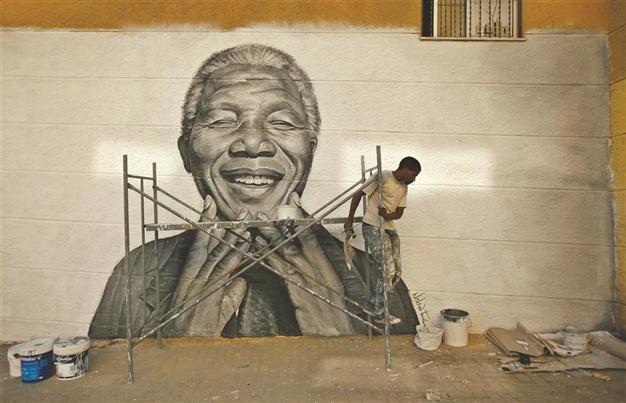South Africa offers guidance in reconciliation for Turkey
Emine Kart JOHANNESBURG/DURBAN

A mural of Mandela is seen in this photo. The ongoing experience in South Africa is a living portrayal of the remembrance of grievances without grudges in order not to allow a repetition of such grievances. REUTERS photo
“So we are getting prepared for a life without Mandela,” says a South African young lady with a tone reflecting her sorrow.
Yet, the sound of her voice also reflects her confidence in the endurance of the guidance of Nelson Mandela who led the fight for democracy in her country which will mark its 20th anniversary of becoming a free country, that’s to say the end of the apartheid regime, next April 27.
The young lady, who was nine years old when democracy came to her country, doesn’t have concerns for the future that are alike to the concerns of many South Africans, who have been suffering from sharp discrepancies. Still, anxiety over the need for further democratization is common for a majority who are well aware of the vitality of democratization for eliminating those discrepancies.
Time in South Africa has its intense moments of both sadness and hopefulness.
The feeling of depression comes when seeing verbal and written documentation of what happened during apartheid regime, prompting one to ask “How can a human being do these things to another human being?”
Rosy moments which are fortunately dominant come as having witnessed what human pride has been able to succeed in achieving in the face of grave oppression.
Remembering the past in order to avoid repeating itThe South African Embassy has been hosting a group of journalists from Turkey on a packed familiarization program which covers Johannesburg, Durban and Cape Town.
The mutual eagerness of the two countries’ for improving relations can be easily observed at governmental level, especially through bilateral visits that have taken place in the last few years reciprocally. Now, the South African side has apparently moved to improve people-to-people relations.
Having been here at a time when Prime Minister Recep Tayyip Erdoğan was expected to announce a long-awaited “democratization package,” – that is to say a set of reforms which would hopefully ease resolution of the Kurdish issue through ending the three-decade long conflict between Turkey’s security forces and the outlawed Kurdistan Workers’ Party (PKK) – it becomes inevitable for the group coming from Turkey to dwell on the South Africa’s experience via drawing parallels between the history and current shape of the Kurdish issue.
Yet, analogies may be misleading, sometimes even dangerous. When the issue is finding an honorable resolution for each and every citizen of Turkey, such an analogy may be offending for non-Kurdish citizens because of the feeling of having been associated with the apartheid rulers/supporters.
That is one thing. On the other hand, if reconciliation is a matter of finding common principles, South Africa offers precious guidance.
The ongoing experience here is a living portrayal of remembrance of grievances without grudges in order not to allow a repetition of such grievance. What Turkey has most of the times tried to do, however, is moving on via denial, with a mentality dictating to the oppressed to forget whatever s/he has been through. Nevertheless, any person or any people first have to remember what it wants to forget.
“You must know your past and the cruelty that was committed to your people. But don’t keep this too much in mind because we are here to build a new South Africa. That is what you must commit yourselves to. You remember what has happened in the past so that, in future, you can avoid it,” Mandela said in late 2003, when he returned to the Old Fort.
Old Fort, where Mandela was also once detained, is one of the three prisons-turned-museums forming Johannesburg’s infamous century-old prison complex.
The complex, once home to thousands of prisoners such as Mahatma Ghandi, Robert Sobukwe and the students of the 1976 Soweto uprising, is on the Constitutional Hill which is also the site of the Constitutional Court.
Bricks from the demolished Awaiting Trial Block, part of the Old Fort prison complex, were used in the building of the Constitutional Court in early 2000s.
Recognition of grievancesMandela’s remarks above are displayed at a permanent exhibition at the Old Fort. The remarks are an echo of his reconciliation philosophy that is his legacy to the entire world, but not only to South Africa.
The use of bricks at the court, meanwhile, is one of the best examples showing how simply and clearly this philosophy is reflected in the daily lives of the South African people.
Since the last few years, there has been a mass campaign in Turkey for turning the notorious Diyarbakır Prison, scene of various types of humiliation and torture during the Sept. 12, 1980, era, into a human rights museum.
The fulfillment of such demand instead of “heralding a new prison” to Diyarbakır’s people may be a unique moment of inspiration to be derived from South Africa at a time when the peoples of Turkey have long been eyeing recognition of their joint grievances.
